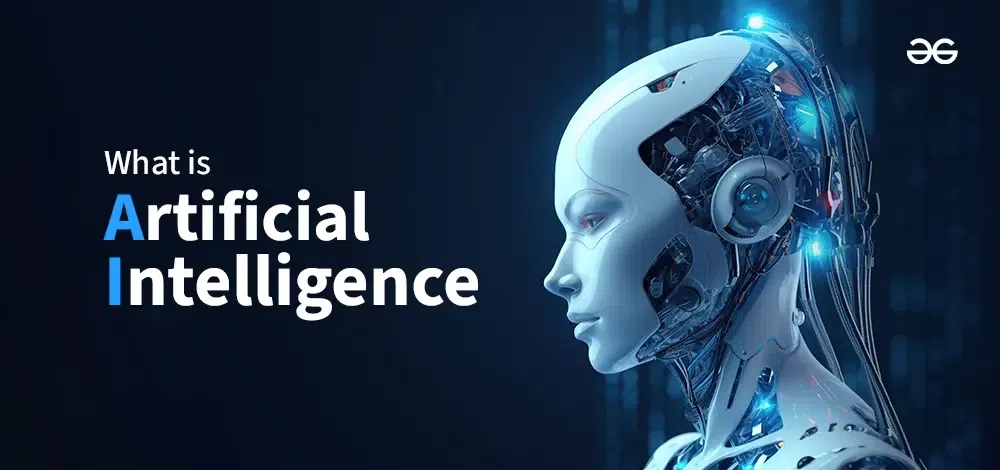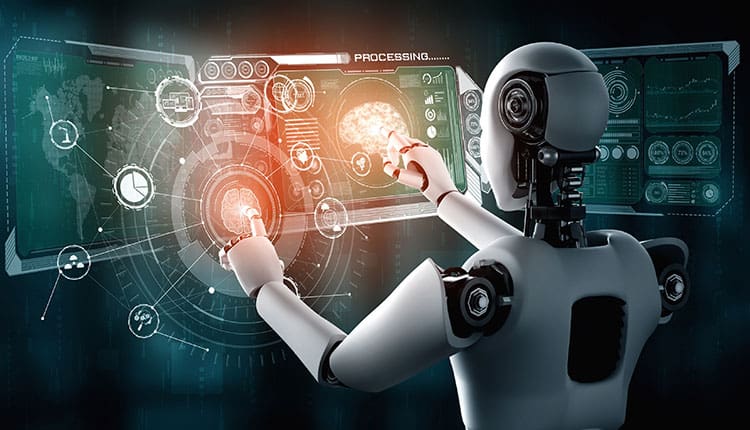We may make cash when you click links to our partners. Learn More.

What is synthetic general intelligence (AGI), and why does it matter? As one of the most talked-about subjects in innovation today, it has actually sparked a race among leading companies like OpenAI and Google to turn this cutting-edge concept into truth. Understanding AGI is essential due to the fact that it has the possible to revamp industries, impact our society in extensive methods, and alter the way we communicate with technology. Here's what you need to know about what it might be able to do, how it might transform industries and fields, and the considerable difficulties facing its advancement.

KEY TAKEAWAYS
• AGI varies from conventional AI in essential methods that it would be able to believe, find out on its own, and adjust to new challenges like humans unlike standard AI, which is developed for specialized jobs and runs within a restricted scope. It needs humans to upgrade and refine abilities. (Jump to Section).
• Once it comes true, AGI would be able to make impressive advances in numerous fields, consisting of health care, research, and finance sectors. (Jump to Section).
• Creating AGI is difficult due to the research challenges that include technical, ethical, and societal concerns. Addressing these challenges is central to preserving the safe and favorable advancement of this innovation. (Jump to Section)
Featured Partners: Artificial Intelligence Software
Find out more
TABULATION
What is Artificial General Intelligence (AGI): A Clear Definition.
Understanding AGI vs Traditional AI.
Potential Applications of Artificial General Intelligence.
Challenges in Artificial General Intelligence Research.
3 Introductory AGI Courses to Consider.
Frequently Asked Questions (FAQs).
Bottom Line: Why Knowing What Is Artificial General Intelligence Matters.
What is Artificial General Intelligence (AGI): A Clear Definition
Artificial general intelligence, or AGI, describes a type of expert system (AI) that can translate, discover, and perform any cognitive job that a human can do. Unlike today's AI, which is constructed to handle particular tasks like suggesting products or processing data, AGI would have the ability to adjust to brand-new difficulties and apply understanding across various fields. In other words, this innovative kind of AI would think and reason like a human. While AGI holds terrific potential, it's worth noting that it is still an idea today, with no fully developed systems offered yet.
Key Capabilities of Artificial General Intelligence

AGI would have a series of abilities that mimic human intellectual functions, so it can perform tasks beyond the narrow focus of the present AI tools in the market. Some key capabilities consist of the following:
Human-Like Reasoning: The innovation would be able to comprehend and make choices the way people do. It would think critically, solve problems, and create options based upon its own experiences and past interactions, similar to how we use previous understanding to brand-new circumstances.
Solving Unfamiliar Problems: One of AGI's strengths is its prospective to take on brand-new problems. Unlike conventional AI, which is trained to carry out specific jobs, AGI would have the capability to manage issues it hasn't been directly trained to solve. It might find out how to approach a totally brand-new obstacle, simply like humans do when confronted with something we've never come across before.
Self-Learning and Adapting: AGI might tweak its abilities and discover from experience, without the need to be manually updated whenever. It would observe and analyze data, learn from errors, and find better methods to complete tasks gradually. This means AGI could adjust to brand-new situations and improve at tasks by itself.
Using Knowledge Across Different Areas: AGI would be able to take what it finds out in one area and forum.batman.gainedge.org apply it to other jobs. For example, if it found out how to solve math issues, it might use that understanding to resolve obstacles in other fields, like science or organization. The ability to move abilities throughout different areas is something humans do naturally and would make the technology versatile in diverse sectors.
Understanding and Reacting To Emotions: Recognizing and responding to human emotions would likewise be within AGI's abilities. This would be essential in settings where comprehending individuals's sensations matters, such as healthcare, customer service, wiki.rrtn.org or social scenarios. By reacting to feelings appropriately, AGI would be better geared up to work with people in a reliable way.
Understanding AGI vs Traditional AI
The table listed below provides a photo of the significant differences between AI and conventional or narrow AI by highlighting their abilities, versatility, and existing status.
AGI would have the ability to believe, discover autonomously, and adapt to new difficulties like humans. However, it is still theoretical and has not been recognized yet. On the other hand, standard AI is built for specific tasks and runs within a repaired scope. It can not adjust to new jobs without human input.
For example, an AGI might find out to diagnose medical conditions, then use that knowledge to establish individualized treatment plans-and even adjust its technique based upon the patient's development. Additionally, it might use this problem-solving capability to jobs in totally various fields, such as developing organization techniques or encouraging on environmental preservation. On the other hand, standard AI, like a diagnostic tool, can only analyze medical information for particular conditions. It can not adjust to other locations or improve on its own.

Potential Applications of Artificial General Intelligence

While AGI isn't here yet, its possible applications span many fields and hold excellent promise of extreme developments in numerous sectors. Without being restricted to specific jobs like narrow AI, AGI would be highly flexible and might use its capabilities to resolve multi-disciplinary problems. It might get rid of obstacles presently beyond the capabilities of existing AI applications.
Transforming Healthcare
AGI would change the game in health care by identifying complex and rare illness with higher precision, even in cases where symptoms are ambiguous or overlap with multiple conditions. It could produce highly tailored treatment strategies by studying patient history, genetic information, and real-time health data. In addition, AGI might accelerate drug discovery, recognizing possible treatments in weeks instead of years by processing enormous datasets and running predictive simulations.
Advancing Scientific Research
In clinical research study, AGI would be able to imitate experiments, wifidb.science evaluate elaborate datasets, and create hypotheses. It could speed up breakthroughs in quantum physics, genomics, and climate science. By integrating understanding from numerous domains, the innovation could discover connections and services that may otherwise go unnoticed by traditional AI.
Improving Industry
Organizations in the commercial field might utilize AGI to boost effectiveness in real-time by handling entire supply chains. It would anticipate and solve disturbances before they take place. In manufacturing, it could oversee autonomous factories, optimizing production processes while maintaining safety and quality requirements. Its capability to change to altering scenarios would make it an indispensable tool in industrial environments.
Enhancing Business Strategy

AGI might enhance business decision-making by assessing market patterns, consumer behavior, and functional information to find chances and threats. In contrast to narrow AI systems, AGI would innovate services to tough company problems, such as handling financial unpredictability or forecasting long-lasting market shifts. Its ability to learn from varied sources would empower services to stay competitive.
Redefining Finance
In the monetary sector, AGI could increase forecasting precision by finding patterns in huge quantities of monetary information, so financiers and organizations can make informed choices. It would also have the ability to find fraud in real-time by acknowledging subtle anomalies that conventional AI systems might miss. Additionally, AGI could develop more robust financial models, factoring in complicated variables and circumstances to mitigate threats.
Challenges in Artificial General Intelligence Research
Developing AGI is one of the most enthusiastic objectives in innovation, however it comes with many problems. These challenges include technical, ethical, and social locations, making AGI advancement an elaborate and multi-faceted process. Overcoming the following challenges is tantamount to ensuring security, supporting ethical standards, and carefully preparing how AGI's intro and use will affect people, markets, and society as a whole:
Making AGI Truly Flexible: AGI would need to deal with a wide variety of issues and adjust to new circumstances, similar to people. Building a system of flexibility is extremely tough due to the fact that existing AI tools are not created to believe or find out at this level of sophistication.
Massive Computing Needs: To reproduce human intelligence, AGI would require huge quantities of calculating power to process details from diverse sources quickly. Determining how to make such systems powerful and efficient enough for real-world use is a substantial challenge.
Understanding Human Intelligence: We do not fully understand how human thinking works, specifically complex aspects like instinct or awareness. Without this understanding, it's challenging to develop machines that can emulate human-like thinking.
Making AGI Safe and Ethical: AGI could potentially be misused, like to produce biased systems or damaging tools like autonomous weapons. Researchers must make sure that AG is constructed responsibly and follows strict ethical standards. This is a challenging job that requires worldwide cooperation.
Keeping It Under Control: There's a danger AGI might act in methods we do not expect, particularly since it would have the capacity to find out and change in time. Ensuring that these systems stay lined up with human values and are safe to utilize is one of the biggest obstacles in AGI research.
Impact on Jobs and Society: If AGI comes true, it might replace jobs or cause economic inequality by benefitting some groups more than others. Preparing for these social impacts is just as essential as constructing the innovation itself.
High Costs and Resources: Researching AGI demands a lot of money, time, and expert knowledge. Not all companies have these resources, slowing down development and leaving smaller companies out of the race.
3 Introductory AGI Courses to Consider
Familiarizing yourself with AGI can give you a competitive edge, whether you wish to advance your career in AI or merely want to stay notified about emerging innovations. The following introductory courses can help you gain a much deeper understanding of what synthetic general intelligence is, so you can solidify your understanding about this promising AI advancement.
Artificial General Intelligence (AGI): An Introductory Course on Udemy
This Udemy course offers a fundamental understanding of AGI, ideal for beginners without any previous experience. The course covers appropriate topics, consisting of the foundations of AI, the fundamentals of AGI, and the most recent patterns in the field. It also checks out the advantages, dangers, and difficulties related to AGI, equipping you with insights into what the innovative innovation can attain. The whole course consists of 15 lectures and can be finished in roughly 45 minutes. Upon conclusion, you will get a certificate to strengthen your qualifications in the task market. This introductory course costs $24.99.
Intro to Artificial General Intelligence (AGI): Future of AI on Udemy
Udemy's introductory course uses an extensive overview of AGI for learners with no technical background. It goes over the historic context and foundation of AGI, the distinctions between narrow AI and AGI, and ethical considerations surrounding its development. In addition, it deals with future patterns in AI and AGI, shedding light on the obstacles and opportunities that lie ahead. Spanning one hour and 46 minutes, the course includes 39 lectures, on-demand video, and downloadable resources. It also has a dry run at the end to strengthen your understanding. You will be awarded a certificate when you finish the course. It is readily available as part of Udemy's premium plans, starting at $20 each month, or as a different purchase of $49.99.
Artificial General Intelligence (AGI) on Udemy
This Udemy course brings a clear and concise introduction to the topic, with on-demand videos and 22 lectures. It elaborates on significant AGI ideas and the role of robotics in AGI advancement. It likewise analyzes the ethical, software application, and hardware difficulties in creating AGI. The course supplies tests to check your understanding and a certificate of conclusion. Priced at $44.99, it is made for learners at any level, making it available and important for anyone who wants to find out more about AGI.
Frequently Asked Questions (FAQs)
Achieving AGI might reinvent industries, boost decision-making, and cause considerable improvements in innovation. However, it likewise raises concerns about ethics, task displacement, and the need for appropriate guideline to ensure it is developed safely and properly.
Experts disagree on how far we are from achieving AGI. Sam Altlman of OpenAI believes in 2025, AI representatives may join the labor force, eventually leading the way to AGI development. On the other hand, a study of AI scientists puts the typical quote around 2047. Despite rapid AI advancements, current systems are still restricted to narrow jobs and lack the broad, flexible reasoning of humans-so AGI is most likely still decades away.
The idea of AGI totally replacing people is still discussed. Although it's most likely that AGI will assist us by taking over repeated jobs, there is a possibility that it might displace particular tasks. That stated, rather than completely changing humans, AGI is expected to work alongside us, dealing with technical responsibilities while we concentrate on jobs that need imagination and empathy. At the end of the day, the results of AGI will depend on how society selects to handle and incorporate it.
Bottom Line: Why Knowing What Is Artificial General Intelligence Matters
Understanding synthetic general intelligence is essential because this innovation might alter industries, fix challenging issues, and transform how we utilize AI. But as we begin to establish AGI, we need to carefully deal with numerous challenges, including technical issues, ethical concerns, and its general effect on society. By finding out about AGI's possible and dangers, we can pursue making sure it is developed properly and utilized in manner ins which would benefit everyone.








